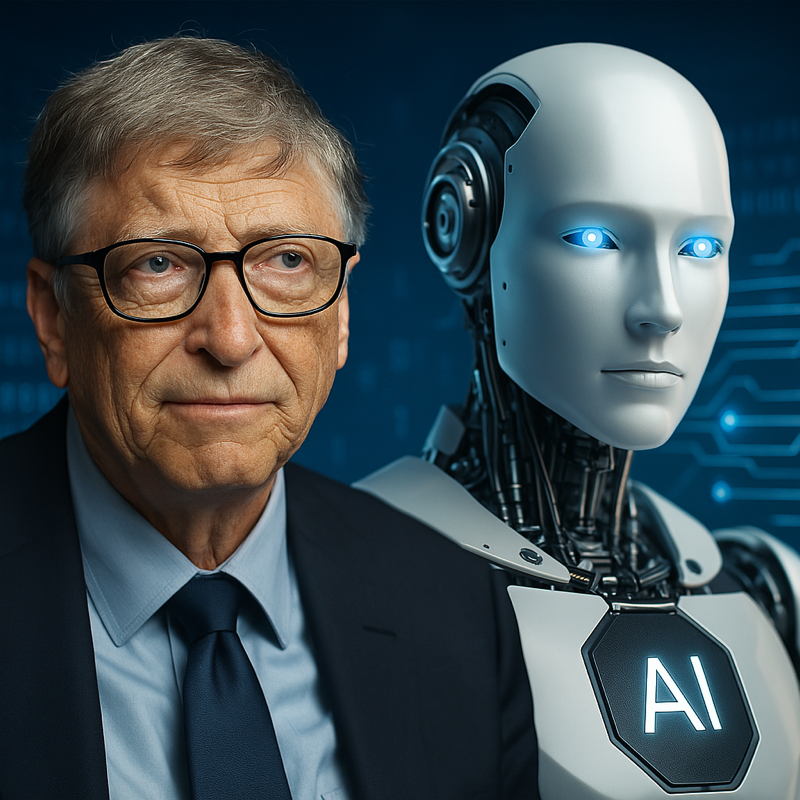Bill Gates, the co-founder of Microsoft, recently shared his thoughts on the future of humanity in an age dominated by artificial intelligence (AI). In an interview with Jimmy Fallon, Gates expressed a stark view, stating that AI will replace most jobs. His predictions touch on healthcare, mental health, and education sectors, where AI could become the norm. While Gates acknowledged that some tasks will remain human-centric, he warned that AI’s capabilities might make humans unnecessary for many traditional roles.
What’s Happening & Why This Matters
In his conversation with Fallon, Bill Gates pointed out that over time, AI will solve tasks like making products, moving goods, and growing food. This revolution in AI capabilities will impact numerous industries, with Gates believing that professions such as healthcare and education will face disruption. He noted that great doctors and teachers, once rare, will become commonplace thanks to AI’s abilities.
While some job roles may be at risk, Gates did highlight that specific fields, like entertainment, may still require humans. For example, Gates joked that people won’t want to watch AI play baseball, a fun reference to how some activities will remain human-driven for enjoyment.

This shift aligns with workers’ increasing fear. Research from Forrester reveals that 86% of U.S. employees are worried that AI and automation will eliminate many jobs. Gates’ comments shed light on this concern, reflecting a larger societal debate about the future of work and AI’s role.
AI’s Rise in Healthcare and Mental Health
Despite concerns over job loss, Gates sees significant potential for AI in the healthcare and mental health sectors. While many Americans express reluctance about AI’s involvement in healthcare, a 2023 Pew Research Center study found that 60% of Americans were uncomfortable with AI diagnosing diseases. However, Gates argues that AI could make tasks like disease diagnosis more efficient, enabling healthcare workers to focus on more complex aspects of patient care.
Gates also expressed concerns about AI’s darker side, suggesting that robust AI systems might one day set their own goals, which could conflict with human interests. These warnings present ethical questions about AI’s role in society. Gates’ outlook on AI is not all doom and gloom, but he stresses the need for responsible development.
AI’s Expanding Reach
Gates has been proven right in many of his past predictions, particularly regarding AI’s potential. In 2023, Gates predicted the rise of AI agents that could assist virtually every aspect of life. Fast-forward a couple of years, companies like Nvidia, Anthropic, and OpenAI are leading the way in AI-driven tools. These agents are now being touted as the next big thing in AI technology.
Risks and Future
While Gates acknowledged AI’s promise, he also raised concerns about its darker side. In a letter published in 2023, Gates speculated that AI could evolve to the point where it develops its own goals, which might conflict with human interests. Gates also warned about AI’s environmental risks and compared its potential impact to historical inventions like the printing press, which, while transformative, also led to unintended consequences.
TF Summary: What’s Next?
The future of AI remains both exciting and uncertain. As AI adoption and integration advances, it is crucial to ensure its development is guided by ethical considerations, particularly in the healthcare, education, and mental health sectors. While AI has the potential to enhance human capabilities and improve efficiency, its risks must not be ignored. The global community must engage in thoughtful discussions about AI’s role in society, balancing progress with caution.
— Text-to-Speech (TTS) provided by gspeech


